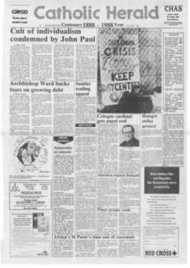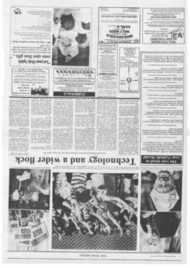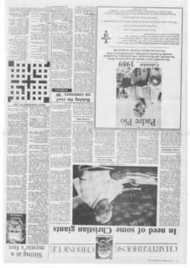Page 7, 30th December 1988
Page 7

Report an error
Noticed an error on this page?If you've noticed an error in this article please click here to report it.
Tags
Share
Related articles
A Movement Towards Post-war Poetry
Amid The Howls And Trivia A Real Poet
From Scripture To Stanza, Parable To Poetry
St. Thomas More
Not A-verse To Conviction
- ea ten Sir Roy Shaw PHILIP LARKIN is the most popular
poet in Britain since the second world war. He believed that poetry is "inextricably bound up with giving pleasure" and he practised what he believed. He died in December 1985, but his poetry lives on and now we have, for the first time, all his poems in one splendid volume.
A fellow poet, Peter Levi has said that "no other poet" since Milton has ever written so consistently well so he managed to combine popularity and quality no easy achievement these days. Another poet, Anthony Thwaite, has edited this collection and has found 61 hitherto unpublished poems from Larkin's mature years. So we are offered a rich source of new pleasures.
Larkin explores the human condition with wit, irony and precision. He was not a very happy man and he never married. He missed a lot, but he turns his deprivation into a source of poetic creativity, saying, "Deprivation was to me what daffodils were to Wordsworth".
For 30 years, he was librarian at the University of Hull and spurned the attractions of the metropolis. He could be very funny and illuminating about the mixed feelings we all get about the work we do, in a poem called Toads:
Why should I let the toad work Squat on my life ....
Ah, were I courageous enough To shout Stuff your pension! Like most of us, he carried on; how and why he shows in a later poem, Toads Revisited.
He pretended, unconvincingly, not to like people all that much, but he is mourned by a large circle of friends, many of them his fellow poets. He certainly did not enjoy formal social gatherings and has left us a funny-sad poem ( Vers de Societe) to prove it:
I could spend half my evenings, if I wanted Holding a glass of washing sherry, canted Over to catch the drivel of some bitch
Who's read nothing but Which Nevertheless, he accepts the invitation from a university colleague which prompted the poem because, although in youth he had cherished solitude, he now realises:
Only the young can be alone The time is shorter now for company And sitting by a lamp more often brings Not peace, but other things
Many of his most memorable major poems celebrate the rituals which shape our lives. The rightly famous Whitsun Weddings combines humour and admiration in memorable lines. Show Saturday evokes the atmosphere of an annual country show and finds value in this coming together where people "regenerate union". Therefore, he ends, "Let it always be there". He sees hope in the unselfconscious rituals of ordinary people.
Larkin has sometimes been accused of being too negative, but after his death, writer-friends brought out a memorial volume whose title An Enormous Yes was taken from his poem For Sidney Bechet, expressing his joy at the great jazz performers' playing:
On me your voice falls as they say love should Like an enormous yes.
For many of us, Larkin's own voice falls like an enormous yes, or rather, a yes-but. For he had his doubts about the splendours of life and love. He claimed to have no religious belief and saw death as the end of everything; but unlike some unbelievers, he did not look forward to oblivion. He was terrified of it; This is a way of being afraid No trick dispels. Religion used to try, That vast moth-eaten musical brocade Created to pretend we never die Catholic readers may find this offensive, but it only expresses
what many of our fellow citizens feel and should evoke our compassion. Ironically, one of Larkin's best poems is called Church Going, a profound evocation of the strange power of a consecrated building which prompted at least one critic to suggest Larkin was, after all, a believer.
But we don't evaluate poets according to their beliefs — or unbeliefs — we judge their power to use language to illuminate the human condition.
I disagree with many of Larkin's attitudes, not least his attitudes to religion and politics but I still find him the most perceptive and enjoyable poet of his generation.
blog comments powered by Disqus











